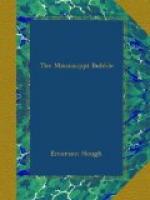“Never beyond this,” replied Du Mesne, “and indeed not so far by many hundred miles. For my own part I rely chiefly upon the story of my brother, Greysolon du L’hut, the boldest soul that ever put paddle in the St. Lawrence. My brother Greysolon, by the fire one night, told me that some years before he had been at the mouth of the Green Bay—perhaps near this very spot—and that here he and his brothers found a deserted Indian camp. Near it, lying half in the fire, where he had fallen in exhaustion, was an old, a very old Indian, who had been abandoned by his tribe to die—for that, you must know, Monsieur, is one of the pleasant customs of the wilderness.
“Greysolon and his men revived this savage in some fashion, and meantime had much speech with him about this unknown land at whose edge we have now arrived. The old savage said that he had been many moons north and west of that place. He knew of the river called the Blue Earth, perhaps the same of which Father Hennepin has told. And also of the Divine River, far below and tributary to the Messasebe. He said that his father was once of a war party who went far to the north against the Ojibways, and that his people took from the Ojibways one of their prisoners, who said that he came from some strange country far to the westward, where there was a very wide plain, of no trees. Beyond that there were great mountains, taller than any to be found in all this region hereabout. Beyond these mountains the prisoner did not know what there might be, but these mountains his people took to be the edge of the world, beyond which could live only wicked spirits. This was what the prisoner of the Ojibways said. He, too, was an old man.
“The captive of my brother Greysolon was an Outagamie, and he said that the Outagamies burned this prisoner of the Ojibways, for they knew that he was surely lying to them. Without doubt they did quite right to burn him, for the notion of a great open country without trees or streams is, of course, absurd to any one who knows America. And as for mountains, all men know that the mountains lie to the east of us, not to the westward.”
“’Twould seem much hearsay,” said Law, “this information which comes at second, third and fourth hand.”
“True,” said Du Mesne, “but such is the source of the little we know of the valley of the Messasebe, and that which lies beyond it. None the less this idea offers interest.”
“Yet you ask me if I would return.”
“’Twas but for yourself, Monsieur. It is there, if I may humbly confess to you, that it is my own ambition some day to arrive. Myself—this West, as I said long ago to the gentlemen in London—appeals to me, since it is indeed a land unoccupied, unowned, an empire which we may have all for ourselves. What say you, Monsieur L’as?”
John Law straightened and stiffened as he stood. For an instant his eye flashed with the zeal of youth and of adventure. It was but a transient cloud which crossed his face, yet there was sadness in his tone as he replied.




